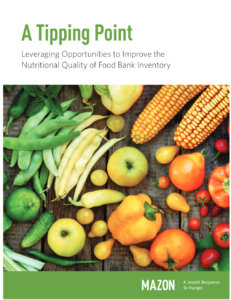Next week, President Biden will host the historic White House Conference on Hunger, Nutrition, and Health. Given the broad scope of the Conference, and the Administration’s goals to “end hunger and increase healthy eating,” we would be remiss if we did not revisit and reflect on MAZON’s groundbreaking 2018 report, A Tipping Point: Leveraging Opportunities to Improve the Nutritional Quality of Food Bank Inventory.
A Tipping Point was the culmination of a decade of MAZON’s work with food banks around the country, helping them to implement strategies for acquiring and distributing healthier foods. At the time, there was momentum building in the field as food banks across the country began to prioritize the health and wellness of those they serve, but we needed data to see how the field was responding and what more could be done to improve nutritious offerings through the charitable food system.
The report revealed that a staggering 25% of the inventory distributed from food banks at the time consisted of “junk food” while only about 30% of the food distributed was fresh produce. In presenting this data, MAZON recommended concrete ways for food banks and other direct service providers to develop and implement formal nutrition policies, as well as ways to incentivize healthier food donations.
Simply put, A Tipping Point changed the game. It jolted the field and served as a lever of change.
In the years since MAZON released A Tipping Point, there has been a significant shift in thinking about nutrition in the context of food banks. National organizations now have the data, support, and strategies to implement nutrition standards. Around the country, food banks have made significant progress shifting their organizational policies to prioritize the nutrition and health of those they serve.
But we know that the charitable food system was never intended to be the solution to hunger, nor was it intended as a regular source of supplemental nutrition. Most people who visit food pantries do so only after depleting their SNAP dollars and stretching their limited monthly budgets. We also know that, unfortunately, some people face obstacles to accessing SNAP and still rely on food pantries and other direct service providers — these obstacles range from policy barriers, to misinformation, to stigma and shame.
Of course, the need for emergency assistance services like food pantries skyrocketed during COVID-19. We all remember the images of the miles-long lines of cars waiting for food distributions. Also during this time, it became even more important for food pantries to help promote healthy eating and provided nutritious foods, particularly given that many people facing hunger also struggle with diet-related health conditions like diabetes, heart disease, and obesity.
COVID-19 also exacerbated the racial disparities that already existed with regard to food insecurity. Black, Indigenous, and other communities of color have always been disproportionately impacted by hunger, and COVID-19 had an outsized impact on these same communities. These disparities are unconscionable. Access to regular, nutritious food is imperative for a healthy life, and every person has this inherent right — regardless of race or zip code.
We at MAZON are eager for next week’s Conference, which we hope will address the importance of building a stronger social safety. Benefits for programs like SNAP must increase to match the reality of the cost of a healthy diet today, allowing people the freedom to make sound nutritional choices. We must talk about the various ways to increase participation and effectiveness of federal nutrition programs.
But we can’t stop there. We must reflect on our past, ask difficult questions about systemic injustices, and engage in honest dialogue about the root causes of hunger in this country. Only then will we be on the path to creating lasting change.

